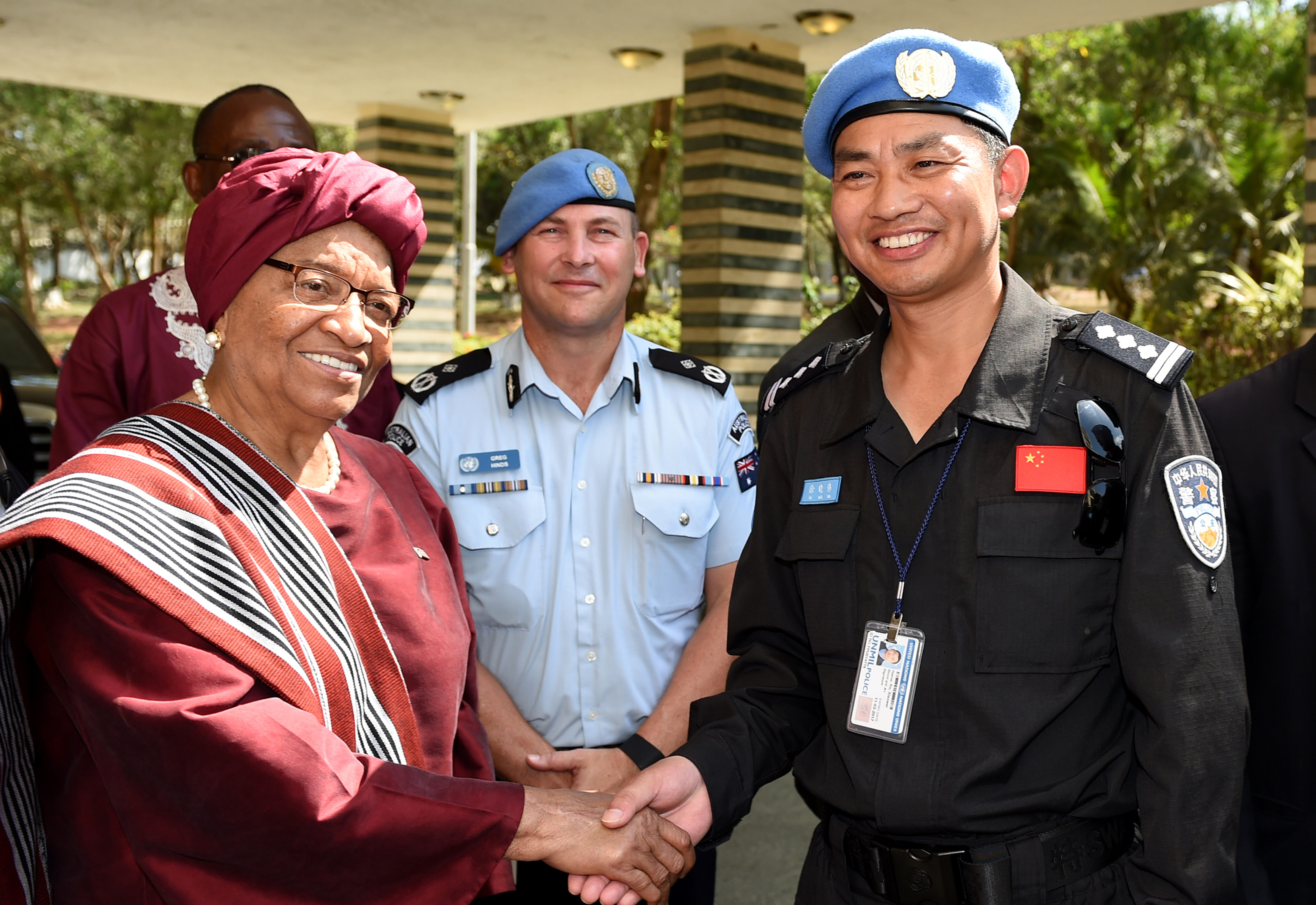Chinese model contributes to UN peacekeeping missions

Liberian President Ellen Johnson Sirleaf (L) meets with Xu Xiaowei (R), team leader of the fourth China Formed Police Unit dispatched to Liberia.
On March 12, the fourth China Formed Police Unit (FPU), which contains 140 members, landed in Hangzhou after completing a yearlong UN peacekeeping mission in Liberia.
Special tasks
China is an important peacekeeping force within the UN. Having been participating in the UN peacekeeping missions since 1990, China has sent over 30,000 troops to 24 peacekeeping missions.
Since 2000, China’s Ministry of Public Security has dispatched more than 2,400 peacekeeping police to at least nine task regions: Timor-Leste, Bosnia and Herzegovina, Liberia, Afghanistan, Sudan, Haiti, South Sudan, Cyprus and Kosovo region. Since September 2013, China has sent three FPUs to Liberia. The fourth unit left for the capital Monrovia in March 2016 and was tasked with maintaining security and order there.
After receiving three months of intensive training on international laws, arms use and language skills before their departure, the whole team met the quality standards and went through the UN assessment with remarkable results.
There were two major challenges in Liberia, team leader Xu Xiaowei said: One is violence and terrorism and the other is the infectious disease. According to UN rules, the peacekeeping force is not allowed to proactively get involved in battles in task regions. In the face of attacks, theft and other practical threats, the unit took various measures, like formulating tactics, building mechanisms and organizing drills to ensure the proper handling of emergencies.
To prevent the outbreak of viruses, like Ebola, Lassa fever and malaria, the fourth China FPU conducted strict anti-epidemic measures and engaged in building the Chinese medical teams in Liberia.
Organizational assurance
Facing a complicated environment in Monrovia, the unit realized that Party organizations at different levels should play a leading role in coordinating efforts to cope with the various challenges and protect the interests of overseas Chinese enterprises and Chinese people.
The fourth China FPU initiated a platform for practicing patriotism overseas, fostering an atmosphere for Party construction among all Chinese people in Monrovia, which not only strengthened the competence of the unit but also protected China’s overseas interests.
In addition to establishing a bulwark for team members through institutional construction and activities, the fourth China FPU also spread the benefits of the work to Chinese enterprises in Liberia, enabling them to become a reliable force for China’s going out strategy. He Minghua, leader of the China-Union Investment Company pointed out that many of the company’s technological problems were solved through joint efforts with three other enterprises that were brought together by the fourth China FPU’s Party-construction activities.
Moreover, the fourth China FPU also endeavored to safeguard the safety of Chinese people in Monrovia. For example, in combined patrols and daily patrols authorized by the United Nations Mission in Liberia (UNMIL), they actively incorporated most Chinese enterprises into the patrol routes. In addition to implementing tasks assigned by the UN, all China’s peacekeeping forces have the duty to protect the safety of Chinese enterprises and Chinese people, to safeguard China’s core interests overseas, Xu said.
Innovating service model
Since March last year, the fourth China FPU has carried out 627 operations involving 16 cases of crowd control with more than 16,800 person-time police forces dispatched. Their excellent performance can be greatly attributed to the independent innovation of the information technology-driven peacekeeping service model.
First, the unit collected all sorts of information by surveys, interview and field investigation. Altogether they collected 4,386 pieces of social information, 5,970 pieces of basic information, 7,328 pieces of public security information, and 12,638 minutes of audio and video data. They built a database for the information and established an information-sharing mechanism with other departments.
They also independently developed an electronic geographic information system connected to the database which can be used to judge and analyze data while realizing a dynamic regional early warning system for risks.
The system can clearly show the longitude and latitude of UNMIL facilities and residence of its personnel, the functional governments of Liberia, roads and transportation, gas stations, airports and other major targets. Also, one can get information of villages, communities, hotels, restaurants, as well as key places and people.
After inspecting the fourth China FPU, Farid Zarif, the special representative of the UN secretary-general, said that the unit’s use of data in peacekeeping was the most sophisticated in all peacekeeping forces in the world. China is the forerunner in information technology-driven peacekeeping, he said. Efforts should be made to promote this “Chinese model” for peacekeeping to other operational units, he said.
DU MEI is a reporter at the Chinese Social Sciences Today.
